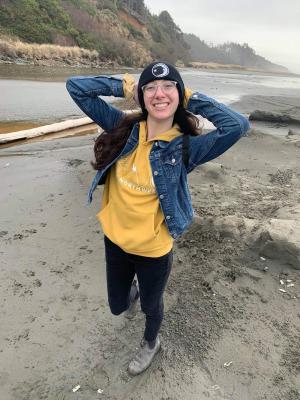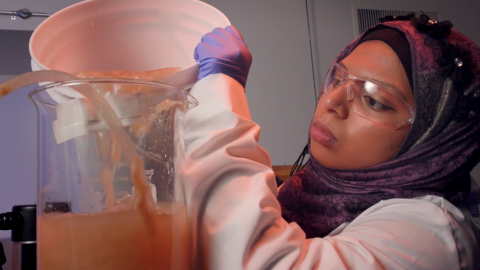Elyse Kelsey recently graduated from the University of Washington in the spring of 2025, with a master’s degree in marine affairs and CHanGE’s Graduate Certificate in Climate Change and Health. Kelsey was a recipient of the prestigious Husky 100 award, which recognizes outstanding undergraduate and graduate UW students. A passionate and driven go-getter, Kelsey is dedicated to community-engaged work that protects public health and builds resilience to climate change.
Stalled by COVID — and inspired by a new path

Kelsey graduated from Western Washington University in December 2019 with a bachelor’s degree in environmental science. Eager to enter the workforce doing fieldwork, she moved quickly through her undergraduate studies, earning her degree in just 3.5 years. She graduated early in December of 2019 – just three months before the COVID-19 pandemic hit. Facing a difficult job market due to the pandemic, Kelsey pivoted away from her original goal of environmental science fieldwork.
Kelsey moved back to her hometown in Sammamish and began working at a before-and-after school care program designed around play-based learning that incorporated Science, Technology, Engineering, and Math (STEM) for elementary students. She fell in love with the program and the opportunity to incorporate her environmental science background to educate youth. She decided to pursue a master’s degree in marine affairs at the UW to further explore her interests in community engagement and science.
The master’s degree in marine affairs is a unique program focused on both policy and working with coastal communities, Kelsey says. She found the program particularly interesting due to her familiarity with shorelines in Washington state. Kelsey is from Washington state, loves the Puget Sound, Salish Sea, and her parents live on the Pacific Coast. Through this program, Kelsey gained a deeper understanding of environmental justice and issues experienced by tribal and coastal communities.
But the curriculum lacked a public health component. CHanGE’s certificate program filled that gap. “I started thinking, I have a general environmental science background and I want to work with communities to advance environmental justice and public health,” Kelsey says. “I started researching programs and that's how I found the Climate Change and Health certificate program and knew it was a perfect addition.”
About CHanGE’s Graduate Certificate in Climate Change and Health

CHanGE’s Certificate offers UW graduate students in any program the opportunity to gain a foundational understanding of climate change and its health impacts, learn effective science communication skills, and apply their knowledge to real-world challenges under faculty mentorship and in collaboration with stakeholders. The program takes an interdisciplinary approach by integrating perspectives not only from Earth science and public health, but also from other relevant disciplines like policy, social work, geography, the built environment, and others. The 15-credit curriculum includes a hands-on Capstone Project where students work with a partner organization to respond to their needs and delve into a climate and health topic of interest.
“Jumping in” to health
With a background in environmental, marine and citizen science but minimal understanding of public health, Kelsey “kind of jumped in blindly,” she says. Since joining the Graduate Certificate program about a year ago, she has learned a lot – from emergency management and hazard mitigation plans, to data analysis software. Currently, Kelsey is finishing up what she describes as one of her favorite parts about the certificate program – her capstone project with the Center for Disaster Resilient Communities, led by Nicole Errett, PhD, MSPH.

Kelsey is studying how public health is incorporated into hazard mitigation plans for four counties on the Pacific Coast. However, Kelsey’s ambition is not stopping there – she is planning to study the hazard mitigation plans for all of the counties in Washington state after she graduates.
Beyond her capstone project, Kelsey also highlights how valuable it has been for her to take classes outside of the marine affairs curriculum. “I've always been interested in public health but I haven't been able to take classes in that field,” she says. “The certificate is great at introducing both the fundamentals of climate science and how to communicate these topics, which isn't a requirement in my grad program.”
Kelsey highlighted the following courses in the certificate program:
- Understanding the Health Risks of Climate Change (ENV H 418/518)
- Climate Change and Public Health Practice (ENV H 479/579)
- Environmental Justice and Population Health (ENV H 575)
- Communicating Climate Change (PUBPOL 582)
Kelsey recounts, “I was able to just fully throw myself into population health. From understanding frameworks to work on-the-ground with communities – I thought, yes, I'm on the right track. This is what I want to do.”
Looking ahead, and keeping faith
With her recent graduation, Kelsey has been busy thinking “what’s next?” Right now, Kelsey plans to pursue work with a public health department at the county- or city-level, doing community-engaged work. Regardless of where she ends up, Kelsey’s mission is to listen to local needs to protect public health and promote resilience, particularly in the face of a changing climate.
“This work is more important than ever, especially in the current political landscape,” Kelsey says. “Keeping up the good work, keeping faith that the work that you're doing is impactful and important and valuable is something that I've been reminding myself while staying the course.”
- Student Spotlight
